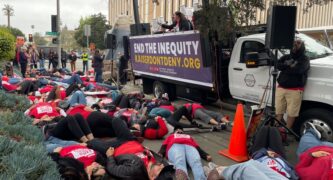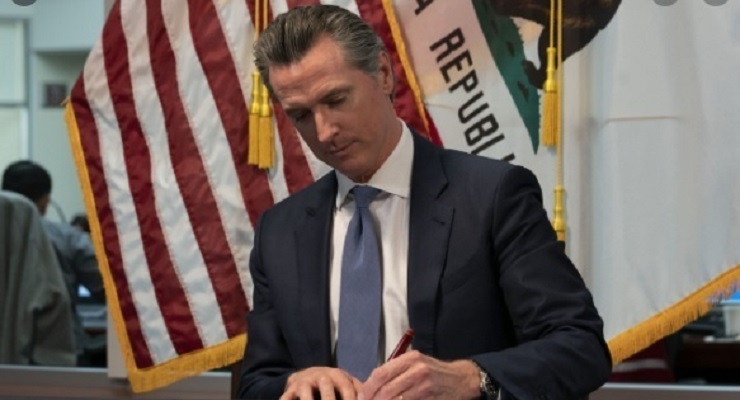
The protest, organized by members of the National Union of Healthcare Workers (NUHW), included therapists, psychologists and social workers who say they are fighting for better working conditions, increased staffing and improved access to care for patients.
“We need to incentivize people to enter into this field, not drive them away,” said striking worker Jade Rosado. “We need to build a future where mental health care workers and social workers are supported, respected and compensated fairly.”
The strike began in early November when more than 2,000 Kaiser mental health professionals across California walked off the job after contract negotiations stalled. Workers say they are seeking not only wage increases but also structural changes to reduce caseloads and improve retention.
Following speeches from Kaiser workers, scores of Kaiser workers staged a “Die-In” on the sidewalk in front of the headquarters building. According to NUHW, the action was “to commemorate the lives that have been lost due to Kaiser underfunding and understaffing its mental health services.”
Kaiser officials said they have continued to bargain in good faith and remain committed to reaching an agreement that supports employees while maintaining high-quality care for patients.
“We respect our employees and appreciate the care they provide,” a Kaiser spokesperson said in a statement. “We’re working to resolve this as quickly as possible.”
Wednesday’s demonstration included speeches, signs reading “Patients Before Profits,” and chants urging Kaiser to return to the bargaining table with a stronger offer. NUHW representatives said the strike will continue until their demands are met.
“This fight is about more than a contract,” said Diaz. “It’s about the future of mental health care in California.”
Kaiser Permanente said it remains committed to resolving the dispute, describing NUHW’s recent actions as “unnecessary and counterproductive.”
Addressing the immediate impact of the strike, Kaiser officials stated that their extensive network of over 13,000 providers, along with 60% of NUHW-represented employees who either chose not to strike or have since returned to work, is sufficient to meet patient needs.
“Any Kaiser Permanente member who needs an appointment is able to get one,” Kaiser said. “Patients in crisis get care 24/7, those with urgent needs can get appointments within 48 hours, and patients seeking non-urgent care are seen on average within six days, which is better than the state’s requirement.”
Negotiations between NUHW and Kaiser are ongoing, but no resolution has been reached.


















